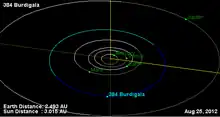 Orbital diagram | |
| Discovery | |
|---|---|
| Discovered by | F. Courty |
| Discovery date | 11 February 1894 |
| Designations | |
| (384) Burdigala | |
| Pronunciation | /bərˈdɪɡələ/[1][2] |
Named after | Bordeaux |
| 1894 AV | |
| Main belt | |
| Orbital characteristics[3] | |
| Epoch 31 July 2016 (JD 2457600.5) | |
| Uncertainty parameter 0 | |
| Observation arc | 116.91 yr (42702 d) |
| Aphelion | 3.04508 AU (455.537 Gm) |
| Perihelion | 2.25578 AU (337.460 Gm) |
| 2.65043 AU (396.499 Gm) | |
| Eccentricity | 0.14890 |
| 4.32 yr (1576.1 d) | |
| 173.217° | |
| 0° 13m 42.305s / day | |
| Inclination | 5.59096° |
| 47.8387° | |
| 35.0366° | |
| Physical characteristics | |
| Dimensions | 36.93±2.4 km |
| 21.1 h (0.88 d) | |
| 0.1805±0.025 | |
| 9.64 | |
Burdigala (minor planet designation: 384 Burdigala) is a typical Main belt asteroid.[3] It was discovered by F. Courty on 11 February 1894 in Bordeaux. It was the first of his two asteroid discoveries. The other was 387 Aquitania. Burdigala is the Latin name of the city of Bordeaux.
References
- ↑ William Bolles (1846) A Phonographic Pronouncing Dictionary of the English Language
- ↑ Noah Webster (1884) A Practical Dictionary of the English Language
- 1 2 "384 Burdigala (1894 AV)". JPL Small-Body Database. NASA/Jet Propulsion Laboratory. Retrieved 10 May 2016.
External links
- 384 Burdigala at AstDyS-2, Asteroids—Dynamic Site
- 384 Burdigala at the JPL Small-Body Database
This article is issued from Wikipedia. The text is licensed under Creative Commons - Attribution - Sharealike. Additional terms may apply for the media files.